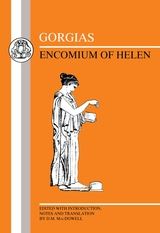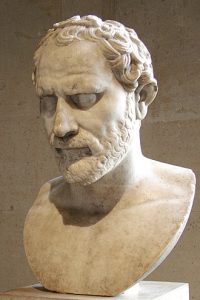Boris Johnson’s persona as ‘Classicist’ informs his public performances as our Prime Minister at almost every opportunity. One day he’s over-simplifying Roman history to a captive audience of school kids. The next, he’s warbling on about Prometheus to a bemused smattering of UN delegates. None of this should lead anyone to think that the discipline of Classics is inherently Brexity or has some special affinity with the right-wing populism and nationalist ideologies he now unleashes on us all.* 
But Johnson’s fondness for citing (and often distorting) Greco-Roman myth and history is a distraction. It’s his appetite for divisive and inflammatory rhetorical slogans at a time of profound crisis which should be the current focus of our concern.
Have Johnson and his Thucydidophiliac spin doctor learned anything from the ancient Greeks about the power of words? Can we blame the influence of the Greeks for the calculated sloganeering? ‘Get Brexit Done’ and ‘Surrender Act’ are clearly sequels to the highly duplicitous ‘Take Back Control’ of 2016. The same goes for appeals to ‘what real people want’ with its pernicious implication that hundreds of MPs, the Supreme Court, and millions of voters are inauthentic citizens and traitors. Is this strategy to divide and incite us all on the one hand, while claiming to be a ‘One-nation Conservative’ on the other, something we can lay at the door of famous ancient writers and rhetoricians?
Well, classical Greek writers and orators absolutely understood that words have consequences. For example, the fifth-century intellectual and teacher of rhetoric Gorgias wrote this:
‘Speech is a great potentate, who by means of the tiniest and most invisible body achieves the most godlike results. For it is able to dispel fear, to assuage grief, to inculcate joy, and to evoke pity’.
He goes on to illustrate this observation with reference to various kinds of public speech: performed poetry, religious songs, magical incantations, persuasive speech, and ‘compelling contests of words in which one speech captures the fancy of the crowd and having been composed artfully persuades everyone, though it is spoken falsely’. He then argues that the ‘power of speech’ affects the soul in the same way that different drugs act upon the body:
‘some [i.e drugs] put an end to sickness, some to life. So some speeches induce grief, some joy, some fear, some instil courage in the audience, and some drug and bewitch the soul with a kind of pernicious persuasion.’
This is all in the service of a designedly entertaining display of Gorgias’ rhetorical firepower, taking the form of a speech defending the actions of Helen of Troy. The bigger point he’s making is that whatever caused Helen to go with Paris to Troy, she’s not to blame. And that would be true even if she was merely persuaded by Paris’ words.
Now, Gorgias is having some fun with his audience here, and it was very much in the interests of so-called sophists like him to represent their expertise in the brand new technology of rhetoric as all-conquering. But the basic assumption that carefully ordered prose, song, poetry or chants can alter our emotions and (hence) actions is at the heart of ancient Greek culture. It goes right back to Homer. Another sophist and speech-writer called Antiphon was said to have started his career by selling his services as a highly effective grief counsellor before he realized what lay at the root of his skills: the art of verbal persuasion.
We might think that there’s a world of difference between the sort of seductive speechifying which Gorgias taught and the Johnson-Cummings approach. The latter is about the relentless repetition of brief phrases which resonate with existing passions or else are carefully designed to whip up negative feelings towards those deemed to be obstructing Brexit: ‘Take Back Control’; ‘Get Brexit Done’; ‘Surrender Act’; ‘Collaboration’; ‘Betrayal’. But these are incantations designed to drug our souls, precisely in the manner which Gorgias describes. They are seductively simple soundbites; slogans which simplify and grossly misrepresent the truth of our predicament. Their primary aim is to secure popular support for a no-deal or any-deal Brexit on 31st October and to funnel votes for the Conservative Party at a date soon thereafter. But they are bewitching some into issuing threats of violence against public figures. The threats of murder and rape are on the increase. An MP’s office has been attacked.
Words have consequences.
No less an orator than Demosthenes understood the power of rhetorical incantations. In his many speeches aimed at changing Athenians’ attitude towards the threat of Philip of Macedon, he repeated the same language about the dangers of inaction and internal treachery. He used the same words again and again even as his wider arguments developed in response to Philip’s manoeuvres.

Bust of the Greek orator Demosthenes. Marble, Roman artwork, inspired from a bronze statue by Polyeuctos (ca. 280 BC). Found in Italy
Boris Johnson is no Demosthenes. But he and his adviser need to see that their slogans are stirring dangerous emotions and actions which take us way beyond the realms of harmless and legitimate electoral-political discourse.
To donate to, or get involved in, the Jo Cox Foundation, go here.
* For the lack of fit between Johnson’s aspirations and the world of the Greeks whom he professes to admire, you can read this entertaining recent blog-post from Prof. Richard Seaford. On Johnson’s mediocre grasp of classical antiquity, you can read this trenchant take-down from Prof. Edith Hall. There also also a lot of insightful cross-platform commentary (e.g this) on Mr Johnson’s many flaws from Prof. Mary Beard. On Dominic Cummings and Thucydides, see this by Prof. Neville Morley.

Who is the author of this piece? I can’t seem to find it anywhere! Thank you.
Found it! Very silly of me. Thanks